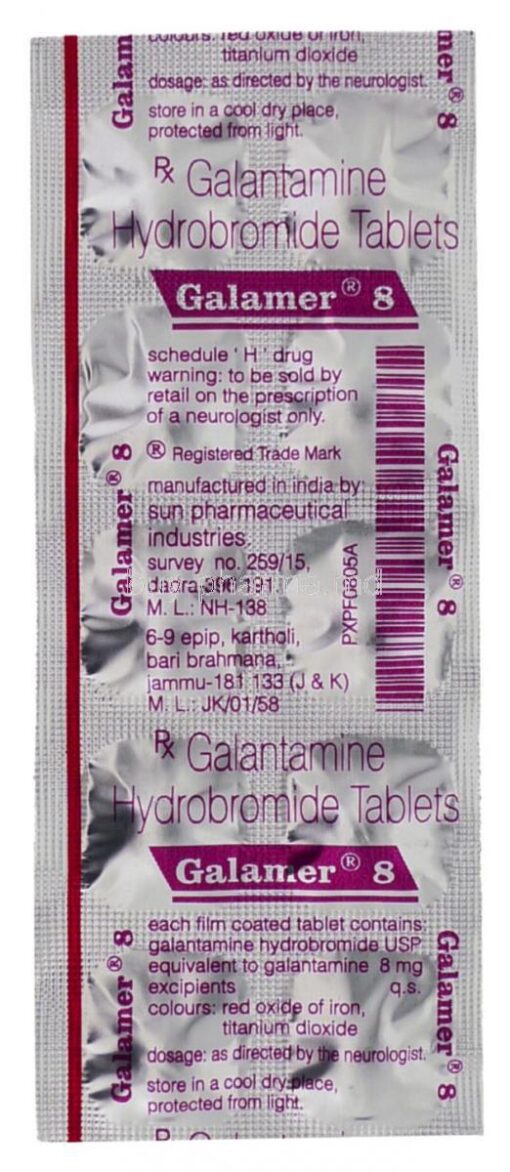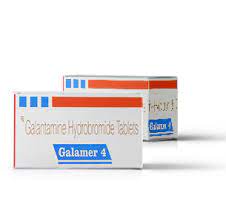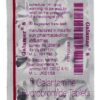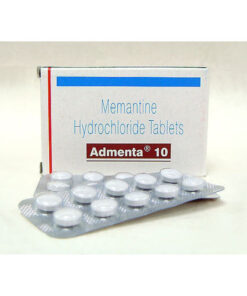Description
Galantamine is a medication primarily used to treat mild to moderate Alzheimer’s disease and other memory-related conditions. It belongs to a class of drugs known as cholinesterase inhibitors, which work by increasing the levels of a chemical messenger called acetylcholine in the brain. This helps improve memory, attention, and the ability to perform daily tasks.
Here is some essential information about Galantamine:
- Dosage: Galantamine is available in both immediate-release and extended-release forms. The typical starting dose is 4 mg twice daily for the immediate-release form and 8 mg once daily for the extended-release form. Your healthcare provider may gradually increase the dosage based on your response and tolerance.
- Side effects: Like any medication, Galantamine may cause side effects. Common side effects include nausea, vomiting, diarrhea, dizziness, headache, and weight loss. In rare cases, Galantamine may cause more severe side effects, such as slow heartbeat, fainting, seizures, or severe allergic reactions.
- Drug interactions: Galantamine may interact with other medications, herbs, or supplements. Inform your healthcare provider of all medications, vitamins, and supplements you are currently taking to avoid any potential interactions.
- Precautions: Galantamine should be used cautiously in people with certain medical conditions, such as liver or kidney problems, heart conditions, or a history of seizures. It is essential to discuss your medical history and any current medications with a healthcare provider before starting Galantamine.
- Pregnancy and breastfeeding: Galantamine is not recommended for women who are pregnant or breastfeeding. It is essential to discuss the potential risks and benefits with a healthcare provider.
- Stopping the medication: Do not stop taking Galantamine without consulting your healthcare provider, as sudden discontinuation may worsen your symptoms. Your healthcare provider will guide you on how to safely stop the medication.
By following these guidelines and discussing any concerns with your healthcare provider, you can ensure the safe and effective use of Galantamine for the treatment of Alzheimer’s disease and other memory-related conditions.
BENEFITS:
Galantamine is primarily used to treat mild to moderate Alzheimer’s disease, vascular dementia, and other memory-related conditions. It works by increasing the levels of a chemical messenger called acetylcholine in the brain, which helps improve memory, attention, and the ability to perform daily tasks. The benefits of galantamine may include:
- Improved memory and cognitive function: Galantamine has been shown to improve memory, attention, and overall cognitive function in patients with Alzheimer’s disease and other memory-related conditions.
- Slowed progression of symptoms: In some cases, galantamine may help slow the progression of symptoms in patients with Alzheimer’s disease.
- Improved quality of life: By improving cognitive function and slowing the progression of symptoms, galantamine may help improve the overall quality of life for patients and their caregivers.
- Reduced agitation and irritability: Some studies have suggested that galantamine may help reduce agitation and irritability in patients with Alzheimer’s disease and other dementias.
It is essential to consult with a healthcare professional before starting any medication, including galantamine, to determine the appropriate dosage and discuss potential benefits and side effects.
SIDE EFFECTS:
Like any medication, Galantamine may cause side effects. Common side effects include:
- Gastrointestinal issues: Nausea, vomiting, diarrhea, and stomach pain are common side effects of galantamine.
- Dizziness: Some users may experience lightheadedness or dizziness while taking galantamine.
- Headache: Galantamine may cause mild to moderate headaches in some users.
- Weight loss: Some users may experience a decrease in appetite or weight loss while taking galantamine.
In rare cases, Galantamine may cause more severe side effects, such as:
- Slow heartbeat: Galantamine may cause a slow heartbeat in some users, which can lead to fainting or other serious problems.
- Seizures: In rare cases, galantamine may cause seizures, especially in users with a history of seizures.
- Severe allergic reactions: Rarely, galantamine may cause severe allergic reactions, including rash, hives, itching, difficulty breathing, and swelling of the face, lips, tongue, or throat.
It is essential to consult with a healthcare professional if you experience any severe or persistent side effects while taking galantamine.
PRECAUTIONS:
Before starting galantamine, it is crucial to inform your healthcare provider about any medical conditions you have, as well as any medications or supplements you are currently taking. Some precautions to consider include:
- Asthma or lung conditions: Galantamine may cause bronchospasms in users with asthma or other lung conditions.
- Kidney or liver disease: Galantamine may need to be adjusted or avoided in users with kidney or liver disease, as it can affect the way the body processes and eliminates the medication.
- Heart conditions: Galantamine may cause slow heartbeat or other heart-related problems, so users with a history of heart conditions should discuss the risks and benefits with their healthcare provider.
- Pregnancy or breastfeeding: The safety of galantamine during pregnancy or breastfeeding is not well-established, so users who are pregnant, planning to become pregnant, or breastfeeding should discuss the risks and benefits with their healthcare provider.
- Anticholinergic medications: Galantamine should not be taken with other medications that have anticholinergic effects, as it can increase the risk of side effects.
- Allergies: Users with a history of allergic reactions to galantamine or other similar medications should avoid using galantamine.
- Age: Older adults may be more sensitive to the effects of galantamine and may require a lower dose or more frequent monitoring.
It is essential to follow your healthcare provider’s instructions when taking galantamine and to inform them of any changes in your health or medications.










15 reviews for Galamer (Galantamine)